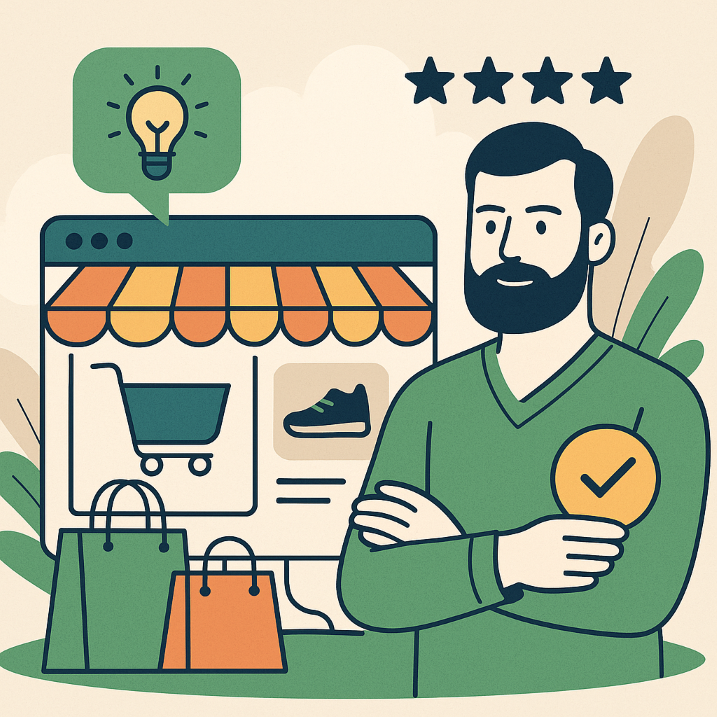
For small and medium businesses, launching an online store today is not just relevant. It is more relevant than ever. But the key shift is that the logic behind creating it has changed. If in the past an online store was primarily a tool for generating organic traffic, today it has become a tool for building trust, expertise, and brand identity.
1. Why an online store matters again, but for a different reason
The classic logic of “we build a website for SEO” no longer works. Search competition has grown so much that top results are consistently dominated by major retailers and aggregators. For small businesses, competing for organic traffic has become nearly impossible.
But the online store is no longer about SEO. It’s about trust.
In 2025, consumers are used to the idea that a marketplace is a place with plenty of products but very little truth. Suppliers of all levels are mixed together, product pages often don’t match reality, specifications are trimmed or carelessly written, and the visual noise makes it hard to understand what exactly the customer is buying.
And when a customer wants to verify that the brand is competent, that real people and experts stand behind the business, they leave the marketplace and go to search. They look for the brand’s website. And once they find it — modern, structured, with a proper catalog and well-presented content — trust emerges instantly. This is the verification point.
The website becomes proof of professionalism. It’s where the buyer comes to see expertise: guidance, recommendations, a deeper assortment structure, proper product presentation, contextual navigation, alternatives and accessories — things marketplaces never show.
And this is something marketplaces fundamentally cannot provide.
A website is the infrastructural layer of brand expertise.
It signals to the market that this business understands its products and takes responsibility for content quality and customer experience.
2. The cost of launching an online store in 2025: affordable and rational
Building an online store is no longer a “big budget” project requiring designers, developers, and system integrators. The tech landscape has simplified to the point where launching a store has become an operational task, not an investment-heavy initiative.
Three factors influence this shift:
- ready-made CMS platforms and templates that meet 80% of the needs of small businesses;
- low-code/no-code platforms that allow you to build a site without technical skills;
- AI tools that help with design, structure, copy, and data processing;
- content management services like NotPIM, which eliminate the biggest barrier: handling product data.
Where previously processing supplier price lists, converting formats, cleaning data, and enriching product descriptions could take weeks or months, today automation handles these tasks: you upload a file, the data is unified, duplicates removed, and the catalog becomes ready to use.
This makes launching a store rational: it is inexpensive, fast, and requires no deep technical involvement.
3. Marketplaces aren’t going anywhere, but they cannot deliver expertise
Marketplaces remain a powerful sales channel. But they cannot be the only one. A marketplace is a rented storefront where you control neither the rules nor the quality of how your product is presented.
Customers increasingly notice the limitations of marketplaces:
- product pages are often incomplete or incorrect;
- different suppliers sell the same product under different names;
- it’s impossible to understand who is responsible for the product;
- there is no depth of expertise: compatibility, alternatives, technical nuances.
For all of this, the user looks for the brand directly.
This is why the website has become more important than ever: it allows the brand to show the expertise a marketplace cannot demonstrate.
4. When an online store is truly necessary
Some categories absolutely require a standalone website:
- Niche product groups where customers value deep assortment and expertise.
- Categories with accessories and compatibility, where expanded linked-product matrices are essential.
- Tools, electronics, and equipment, where customers expect full specifications supported by expert recommendations.
- Any brand seeking long-term customer trust and loyalty.
In all these cases, a website is where the customer receives the professional experience that a marketplace cannot deliver.
5. When you might skip creating an online store
Some niches — rare exceptions — do not benefit significantly from a standalone website:
- narrow B2B segments with individual procurement cycles;
- categories with extremely rapid assortment turnover where customers rely on marketplaces anyway;
- hyper-broad categories competing solely on scale.
But for 80% of small and medium businesses, a website remains a strategic asset.
6. The key idea
An online store is not about traffic. It’s about brand.
It’s the place where your customer sees your expertise, receives deep product information, understands your company’s values, and gets proof that you’re not just another anonymous seller on a marketplace, but a real business.
And while marketplaces give you access to an audience, only your own site gives you access to trust. And in e-commerce 2025, trust is the most valuable asset.